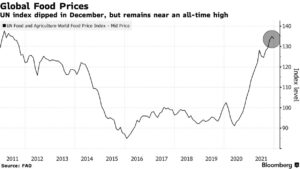Bloomberg's Leah Nylen reported Thursday that "a Colorado judge issued an order temporarily blocking the proposed $25 billion merger of Kroger Co. and Albertsons Cos., which has been challenged by…
Global Food Prices Climb 28% in 2021
Bloomberg writer Megan Durisin reported on Thursday that, “Global food prices declined from near a record high at the end of last year, offering some respite to consumers and governments facing a wave of inflationary pressures.

“A United Nations index tracking everything from grains to meat fell 0.9% in December, potentially helping to ease the run-up in prices of grocery store products.
Still, the gauge remains near 2011’s all-time high and average prices jumped about 28% in 2021, the most in 14 years.
The Bloomberg article noted that, “Food costs are unlikely to stabilize for a while yet, according to Abdolreza Abbassian, a senior economist at the UN’s Food and Agriculture Organization.
“‘Nothing fundamentally changed over the last two to three months to make us feel any degree of optimism that the food market is going to resettle at more steady or even lower prices,’ he said. ‘All of the uncertainties are right there, they haven’t disappeared, which means that anything is still possible.'”
Durisin added that, “The recent energy crunch has sent fertilizer prices higher too, threatening to further add to food-production costs. There are already signs that farmers are cutting back on nutrient purchases or shifting from grains to less fertilizer-intensive crops.”
In 2021 the FAO Vegetable Oil Price Index hit an all-time high, up nearly 66 percent from 2020. https://t.co/ZZ9kUlaJhQ
— Abdolreza Abbassian (@Abbassian_A) January 6, 2022
And Reuters News reported on Thursday that, “World food prices jumped 28% in 2021 to their highest level in a decade and hopes for a return to more stable market conditions this year are slim, the U.N.’s food agency said on Thursday.
“The Food and Agriculture Organization’s (FAO) food price index, which tracks the most globally traded food commodities, averaged 125.7 points in 2021, the highest since 131.9 in 2011.”
The Reuters article explained that, “A surge in the price of fertilisers, linked in turn to spiralling energy prices, has ramped up the cost of so-called inputs used by farmers to produce crops, raising doubts over yield prospects for next year’s harvests.”





